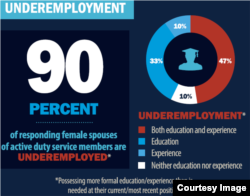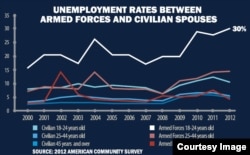Rachel Tice wants more from her career. But the 32-year-old wife of a U.S. Marine captain finds it difficult to keep her working life on track because of the demands placed on military families.
And she’s not alone.
Despite aggressive efforts by the Pentagon and nongovernmental agencies, the wives of active-duty service members have an underemployment rate — meaning that they are working below their capabilities — of more than 90 percent, according to a 2014 Military Officers Association of America report. Husbands of service members were not included in the survey.
This reality is forcing states, businesses and Congress to consider new programs and legislation to accommodate the employment needs of military spouses.
“Retention of our service members remains a priority of the department, and this is one of the factors why the department remains engaged to increase opportunities for spouse employment,” said Lieutenant Commander Nate Christensen, spokesman for the Department of Defense.
But even though the department is initiating several programs, it remains unclear whether the military is adapting fast enough to meet the needs of 21st-century families.
Career interrupted
Tice had worked as a general manager for Equinox Fitness for more than eight years when her husband received a new assignment.
“So, I had a very great career," she said. "I was making significantly more money than my husband when we met. And, I ran into the challenge of having to leave a job because of a PCS [permanent change of station] move. I discovered quickly that it’s not so easy to start over when you have no network,” she said.
Frequent PCS moves are one of the biggest challenges spouses face in maintaining or continuing professional employment. The MOAA report indicated 79 percent of military spouses made at least one move across state lines or overseas in the past five years; 50 percent made at least two moves in the past five years.
Eric Eversole is president of Hire Our Heroes, a nonprofit organization “founded by veterans for veterans” that helps connect service members and their spouses with jobs.
“This is a 21st-century military that needs 21st-century families,” he said. “We need to make sure that both of them are taken care of.”
Today, Tice is working as a career development specialist in Washington. She found her current job at an HOH event and is working with HOH to help spouses like her find benefits, opportunities and meaningful employment. As of October 2014, nearly 370,000 service members and their spouses had been hired through HOH events, according to the U.S. Chamber of Commerce.
Although Tice has a job, she is underemployed. Her job is "a part-time, commission-based position. It’s significantly different in terms of what it looks like on a resume, for sure. But it meets my needs right now.”
Change in expectations
Joyce Raezer, executive director of the National Military Family Association, said the face of the military has changed over the past several decades.
“The family force was a much smaller percentage of the total force 50 years ago,” she said.
Raezer added that military spouses today expect the same opportunities as civilian spouses, and that includes a career.
“So,” she said, “military family expectations have forced a lot of changes.”
Karen Golden, deputy director of government relations at MOAA, said there’s been a shift to recognize, identify and address the barriers and challenges that military spouses face when seeking employment.
“I’ve really seen, probably in the last five years, tremendous attention on the issue, not only from Department of Defense but also from the White House and the Joining Forces initiative,” she said.
Joining Forces, a White House outreach program launched in 2011, works within the public and private sectors to support service members, veterans and their families through job, wellness and educational opportunities. With Congress, the initiative is working to streamline portability of professional licenses — for lawyers or nurses, for example — across state lines.
And programs like Military One Source advise spouses on everything from education and career opportunities to child care.
Raezer said Military One Source provides “information and support to help that family navigate the challenges and the minefields of military life.”
Christensen said the Pentagon is constantly adapting to address the needs of military spouses.
“We are continually reviewing current programs and incorporate feedback from military spouses to help improve these resources,” he said.
However, despite all the new initiatives, Raezer acknowledged there is a fundamental struggle.
“There’s this conflict between the military mission and the family, the spouse’s career needs,” she said.
Necessary sacrifices
Shumaisa Chatters has a master’s degree in computer science and is the spouse of a retired Air Force officer.
“When it comes to being a spouse of a military person, you have to kind of find a balance between what your own inspirations are, what your passions are, and how, you know, you can make his life not difficult,” she said. “Sometimes, actually most of the time, you have to do the sacrifice.”
However, it’s not always the military spouse that makes the sacrifice for the family.
Adam Avitabile and his wife are both veterans; he was in the Marines, and she was in Navy. He left the military first, and once he found a good job, they were forced to make a decision.
“My wife actually decided to get out of the Navy because I was so invested with that company,” he said.
The military has adopted several programs in the past — like Join Spouse or the Exceptional Military Family Program — designed to accommodate location needs of spouses and their families in certain situations.
But professional military spouses with nontransferable careers have no program to protect them. There is no form to submit for the military to take their careers into consideration, particularly when designating their service member’s PCS location.
Raezer said that ultimately, the military mission is going to control the assignment process. However, the armed forces could be doing more, she said.
“They’ve made strides with dual military couples, and they’ve made strides in terms of families with special-needs family members who need to be someplace because of health care and education resources," she said. But with regard to military spouses' careers, she said, the armed forces "haven’t quite gotten there yet.”
VOA's Carla Babb contributed to this report from the Pentagon.






